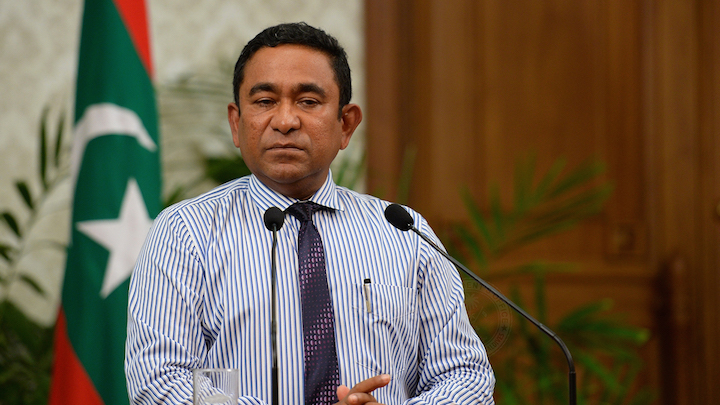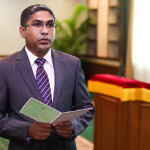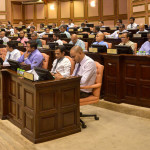Maldives President Abdulla Yameen, in his first public speech following an alleged bomb plot on his speedboat, revealed today the extent of political infighting, betrayal, deception and corruption within his administration.
In an hour-long address, Yameen said his deputy Ahmed Adeeb, now in police custody on suspicion of plotting the assassination attempt, had amassed wealth and power because of the trust placed in him.
Adeeb went on to use state funds to buy influence within the police and to betray the president when he was most needed, Yameen said.
The president, perhaps unwittingly, acknowledged his near-loss of control over the security forces, and painted a picture of a disloyal and unruly cabinet of ministers, some who had attempted to undermine him, while others had failed to consult him on matters of national security.
He also sought to deflect blame for the dismissal and resignation of some eight cabinet ministers within two years, the impeachment of former Vice President Dr Mohamed Jameel Ahmed and the jailing of political opponents, including former President Mohamed Nasheed.
“Is President Yameen trying to eliminate all contenders for 2018? First, President Yameen has not decided to contest in 2018 yet. Second, President Yameen has taken no action to eliminate any of these people. President Yameen has done nothing to isolate any of these people. Anything that has happened to them was the result of action was taken through the courts.”
Appearing somewhat contrite towards the end, Yameen pledged to oversee the day-to-day running of government more closely.
Betrayal
Adeeb, who was formerly in charge of the tourism portfolio and two influential economic committees, was the central subject of Yameen’s speech today.
“Vice President Adeeb was seen as a powerful man, a man that had the president’s trust. He had the resources to accumulate a lot of money. He was also the chair of the [Special Economic Zones] committee. Adeeb was also the co-chair of the economic committee, later the chair. Adeeb’s role was important in coordinating major foreign investments, and I appreciate his service. He had a lot of power and a lot of trust. This allowed room for this incident,” Yameen said.
The president suggested Adeeb had bought influence within the police force by siphoning revenue from resort leases through the state-owned Maldives Marketing and Public Relations Corporation (MMPRC).
Yameen said he only became aware of Adeeb’s influence within the police force after the boat blast “because of information received through the inquiry… This was not authorized, condoned or tolerated by the president.”
After assuming the vice presidency, Adeeb sidelined the president to the extent that he had directed police intelligence information to his table, instead of the president’s.
Some of the MMPRC funds could have been used to bribe MPs, Yameen acknowledged. “All governments and all parties, according to their capacity, or the wealth of certain figures, will help their [MPs]. They will help with difficulties. But we do not know how much money has been given to individual MPs. It is to find that out that we are reviewing how money enters MMPRC, and how the funds are spent.”
When the inquiry into the boat blast began, Adeeb approached the main opposition Maldivian Democratic Party (MDP) and ruling party MPs to impeach the president, Yameen alleged.
“I do not understand why my vice president must try to impeach me.”
Adeeb, like his predecessor, Jameel, had abandoned the president when he was most needed, he went on. “What I know is that, when the government faced challenging circumstances, the former vice president did not support the president.
“The same with the current vice president, when the president faced the most challenging days, he did not support the president.”
Eventful government
Reflecting on the dismissal and resignation of some eight ministers, including two defence ministers, within just two years, Yameen said, “I can say my government is rather eventful,” but insisted that their sacking was not a political decision.
Former defence minister Mohamed Nazim, sentenced to jail for weapons smuggling, was only dismissed when he sought to provoke senior military officers into confronting the president.
“This is where I lost trust in the defence minister. The minister does not have to send senior army officers to confront me. I was thinking that I would not dismiss Nazim until the trial concluded, I was treating him well, but he advised senior officers to confront me, I do not speak about it because of the respect I have for them.”
The most recent defence minister, Moosa Ali Jaleel, was only sacked when it emerged that he had authorised the MMPRC to import fireworks without consulting the president or senior military officers, Yameen said.
The shipment was rushed through customs, without a proper check of what was inside the crates. Explosives from the fireworks could have been used to make the bomb on his boat, he added.
Jaleel is not a suspect, but was sacked because of his family connections to Colonel Ahmed ‘Papa’ Fayaz, a senior military officer now in custody over the blast.
Yameen suggested Fayaz, too, had been allowed to amass too much power. Because he was trusted, Fayaz had been placed as the head of three powerful military departments: the Special Protection Group (SPG) tasked with protecting the president, the armoury, and the elite military unit of explosives experts.
A more active role
In light of the betrayals, Yameen said he is now forced to become more involved in the administration of his government.
“I am not focused on arresting my political opponents. But with all that has happened, there are certain truths that must be accepted. The truth is, despite President Yameen wanting powers to be dispersed with an economic committee, a social committee [inside the cabinet] as two departments to be administered separately by the president and the vice president, and because one individual has been given a lot of power, the issues that have come out could arise again,” he said.
He pledged to personally oversee the cabinet’s economic and social committees.
“I want to assure the Maldivian public, the youth, that I will closely oversee these matters now.”
Since Adeeb had been involved in organising funds and resources for youth groups, alternative arrangements will now have to be made, he said. The loss of Adeeb is “not irrevocable.”
Yameen also said he had asked the courts to expedite opposition leader Mohamed Nasheed’s trial, at his own request. Nasheed had wanted the trial to be completed, in order to be eligible for the 2018 presidency, he claimed.
Correction: October 26, 2012
This article previously said six cabinet ministers had left Yameen’s cabinet. This is incorrect. The correct number is eight.



















